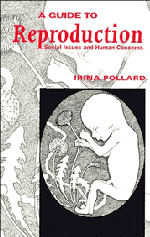Book contents
- Frontmatter
- Contents
- Preface and acknowledgements
- Part one Reproductive biology
- Part two Reproduction and social issues
- 13 Population dynamics, stress and the general theory of adaptation
- 14 Extinctions and the conservation of endangered species
- 15 Artificial control of fertility
- 16 Hormonal contributions to errors of sexual differentiation
- 17 The acquired immunodeficiency syndrome (AIDS) epidemic: a global emergency
- 18 The effect of nutrition and exercise on the hypothalamic–pituitary–gonadal axis
- 19 Principles of teratology and an update on nicotine, ethanol and caffeine abuse
- 20 Ethical aspects of human reproductive biology
- Index
19 - Principles of teratology and an update on nicotine, ethanol and caffeine abuse
Published online by Cambridge University Press: 05 June 2012
- Frontmatter
- Contents
- Preface and acknowledgements
- Part one Reproductive biology
- Part two Reproduction and social issues
- 13 Population dynamics, stress and the general theory of adaptation
- 14 Extinctions and the conservation of endangered species
- 15 Artificial control of fertility
- 16 Hormonal contributions to errors of sexual differentiation
- 17 The acquired immunodeficiency syndrome (AIDS) epidemic: a global emergency
- 18 The effect of nutrition and exercise on the hypothalamic–pituitary–gonadal axis
- 19 Principles of teratology and an update on nicotine, ethanol and caffeine abuse
- 20 Ethical aspects of human reproductive biology
- Index
Summary
DEVELOPMENTAL TOXICOLOGY
This book contains many examples of abnormal development due to either intrinsic defects in gene expression or epigenetic modifications of normal gene expression. Chapter 16, in particular, is concerned with recognized teratogenic derangements of sexual differentiation resulting from exposure to hormonally active xenobiotics. The present chapter outlines the principles underlying mutagenesis, teratogenesis and delayed development. Specific biochemical and physiological mechanisms and common developmental disturbances associated with nicotine, ethanol and caffeine consumption are also examined. It has been repeatedly emphasized that epigenetic factors can, by influencing the activity of genes, impinge on the differentiating oocyte or sperm and modify the identity of the future conceptus. Genomic or parental imprinting during gametogenesis which, at syngamy, begins to direct the normal development of the conceptus’ unique potential is a special case of epigenetic influence (Chapter 8). Teratology, on the other hand, is the science which deals with biological, genetic, biochemical, and behavioural aspects of maldirected development and spans the period from germ cell differentiation to the termination of functional development in the postpartum individual. Behavioural teratologogy refers to long-term effects on behaviour and psychological development. For example, infants prenatally exposed to substances like ethanol, opiates, various catecholamines and caffeine may experience neonatal withdrawal symptoms and neurobehavioural impairment such as hyperactivity, shortened attention span, co-ordination problems and specific learning difficulties.
The early stages of mammalian differentiation are times of greatest development flexibility. A robust genetic constitution may be able to repair mutational damage, although major defects are likely to cause spontaneous abortion or remain unrestored.
Information
- Type
- Chapter
- Information
- A Guide to ReproductionSocial Issues and Human Concerns, pp. 353 - 375Publisher: Cambridge University PressPrint publication year: 1994
Accessibility standard: Unknown
- 2
- Cited by
